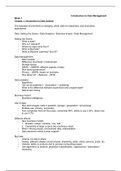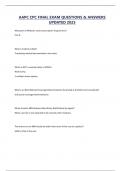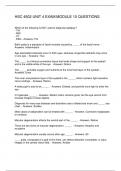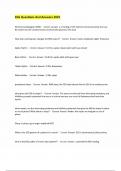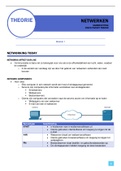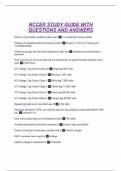ECS3705
NOTES
,Study unit 1
Chapter 2, 3 & 4: Mercantilists, physiocrats and classical forerunners
Chapter 2: Mercantilists
1. The fear of goods
One of the principles of the Mercantilist school is duty free importation of raw
materials that could not be produced domestically, protection for manufactured
goods and raw materials that could be produced domestically and export restrictions
on raw materials. Emphasis on exports & a reluctance to import has been called the
fear of goods.
2. Bullionism
Bullion is another word for plain bars of precious metals. These bars have not been
minted or coined. The idea that wealth is equal to precious metal money and that a
nation’s wealth is therefore consists of the total amount of gold and silver within its
borders is called Bullionism.
3. Major Tenets of the Mercantilist School
Gold and silver the most desirable form of wealth. Mercantilists tended to
equate the wealth of a nation with the amount of gold and silver bullion it
possessed. A few early mercantilists even believed that these precious metals
were the only type of wealth worth pursuing. All of them valued bullion as
the way to achieve power and riches. A surplus of exports from a country was
therefore necessary to generate payments in hard money. Even when at war,
nations would export goods to the enemy as long as the products were paid
for in gold.
Nationalism. All countries could not simultaneously export more than they
imported. Therefore one’s own country should promote exports and
accumulate wealth at the expense of its neighbours. Only a powerful nation
could capture and hold colonies, dominate trade routes, win wars against
rivals, and compete successfully in international trade. According to this static
concept of economic life, there was a fixed quantity of economic resources in
the world; one country could increase its resources only at the expense of
another.
Duty-free importation of raw materials that could not be produced
domestically, protection for manufactured goods and raw materials that
could be produced domestically, and export restriction on raw materials. This
emphasis on exports and a reluctance to import has been called “the fear of
goods.” The interests of the merchant took precedence over those of the
domestic consumer. Merchants received inflows of gold in return for their
exports, while the restrictions on imports reduced the availability of goods
for consumption at home. Consequently, gold and silver accumulated,
supposedly enhancing the country’s wealth and power.
, Colonization and monopolization of colonial trade. Merchant capitalists
favoured colonization and wanted to keep the colonies eternally dependent
upon and subservient to the mother country. Any benefits that spilled over to
the colonies from the home country’s growth and military power were an
accidental by-product of the policy of exploitation.
Opposition to internal tolls, taxes, and other restrictions on the movement
of goods. Mercantilist writers and practitioners recognized that tolls and
taxes could throttle business enterprise and drive up the price of a country’s
exports. An extreme example of this is the situation on the Elbe River in 1685.
A shipment of sixty planks from Saxony to Hamburg required the payment of
fifty-four planks at toll stations along the way! Consequently, only six planks
arrived at the destination.
Strong central government. A strong central government was needed to
promote mercantilist goals. The government granted monopoly privileges to
companies engaged in foreign trade. It restricted free entry into business at
home to limit competition. Agriculture, mining, and industry were promoted
with subsidies from the government and protected from imports via tariffs.
Furthermore, the government closely regulated the methods of production
and the quality of goods so that a country would not gain a bad reputation
for its products in foreign markets, thereby hampering exports. In other
words, mercantilists placed little trust in their own judgment and honesty,
believing that the common interest of merchants required that the
government prohibit poor workmanship and shoddy materials. The result
was a bewildering maze of regulations governing the production of goods.
Importance of a large, hard-working population. Not only would a sizable,
industrious population provide an abundance of soldiers and sailors ready to
fight for the glory and the wealth of the nation, but also it would keep labour
supply high and wages therefore low. The advantage? These low wages
would (1) enable lower prices on exports, thereby increasing the inflow of
gold, and (2) reduce idleness and promote greater participation in the labour
force.
4. Derived demand – This term is often used in the context of the labour market,
meaning that the demand for labour is derived from the demand for goods, either
generally for all goods or particularly for a certain good requiring a particular labour
skill.
5.
6.
7.
8.
NOTES
,Study unit 1
Chapter 2, 3 & 4: Mercantilists, physiocrats and classical forerunners
Chapter 2: Mercantilists
1. The fear of goods
One of the principles of the Mercantilist school is duty free importation of raw
materials that could not be produced domestically, protection for manufactured
goods and raw materials that could be produced domestically and export restrictions
on raw materials. Emphasis on exports & a reluctance to import has been called the
fear of goods.
2. Bullionism
Bullion is another word for plain bars of precious metals. These bars have not been
minted or coined. The idea that wealth is equal to precious metal money and that a
nation’s wealth is therefore consists of the total amount of gold and silver within its
borders is called Bullionism.
3. Major Tenets of the Mercantilist School
Gold and silver the most desirable form of wealth. Mercantilists tended to
equate the wealth of a nation with the amount of gold and silver bullion it
possessed. A few early mercantilists even believed that these precious metals
were the only type of wealth worth pursuing. All of them valued bullion as
the way to achieve power and riches. A surplus of exports from a country was
therefore necessary to generate payments in hard money. Even when at war,
nations would export goods to the enemy as long as the products were paid
for in gold.
Nationalism. All countries could not simultaneously export more than they
imported. Therefore one’s own country should promote exports and
accumulate wealth at the expense of its neighbours. Only a powerful nation
could capture and hold colonies, dominate trade routes, win wars against
rivals, and compete successfully in international trade. According to this static
concept of economic life, there was a fixed quantity of economic resources in
the world; one country could increase its resources only at the expense of
another.
Duty-free importation of raw materials that could not be produced
domestically, protection for manufactured goods and raw materials that
could be produced domestically, and export restriction on raw materials. This
emphasis on exports and a reluctance to import has been called “the fear of
goods.” The interests of the merchant took precedence over those of the
domestic consumer. Merchants received inflows of gold in return for their
exports, while the restrictions on imports reduced the availability of goods
for consumption at home. Consequently, gold and silver accumulated,
supposedly enhancing the country’s wealth and power.
, Colonization and monopolization of colonial trade. Merchant capitalists
favoured colonization and wanted to keep the colonies eternally dependent
upon and subservient to the mother country. Any benefits that spilled over to
the colonies from the home country’s growth and military power were an
accidental by-product of the policy of exploitation.
Opposition to internal tolls, taxes, and other restrictions on the movement
of goods. Mercantilist writers and practitioners recognized that tolls and
taxes could throttle business enterprise and drive up the price of a country’s
exports. An extreme example of this is the situation on the Elbe River in 1685.
A shipment of sixty planks from Saxony to Hamburg required the payment of
fifty-four planks at toll stations along the way! Consequently, only six planks
arrived at the destination.
Strong central government. A strong central government was needed to
promote mercantilist goals. The government granted monopoly privileges to
companies engaged in foreign trade. It restricted free entry into business at
home to limit competition. Agriculture, mining, and industry were promoted
with subsidies from the government and protected from imports via tariffs.
Furthermore, the government closely regulated the methods of production
and the quality of goods so that a country would not gain a bad reputation
for its products in foreign markets, thereby hampering exports. In other
words, mercantilists placed little trust in their own judgment and honesty,
believing that the common interest of merchants required that the
government prohibit poor workmanship and shoddy materials. The result
was a bewildering maze of regulations governing the production of goods.
Importance of a large, hard-working population. Not only would a sizable,
industrious population provide an abundance of soldiers and sailors ready to
fight for the glory and the wealth of the nation, but also it would keep labour
supply high and wages therefore low. The advantage? These low wages
would (1) enable lower prices on exports, thereby increasing the inflow of
gold, and (2) reduce idleness and promote greater participation in the labour
force.
4. Derived demand – This term is often used in the context of the labour market,
meaning that the demand for labour is derived from the demand for goods, either
generally for all goods or particularly for a certain good requiring a particular labour
skill.
5.
6.
7.
8.


